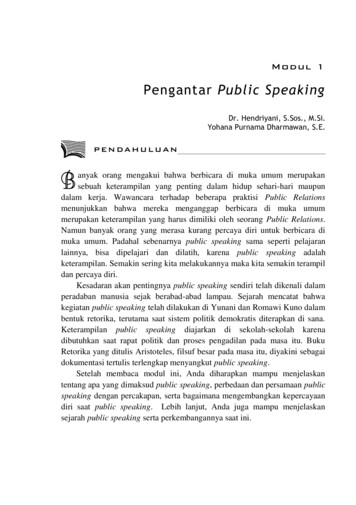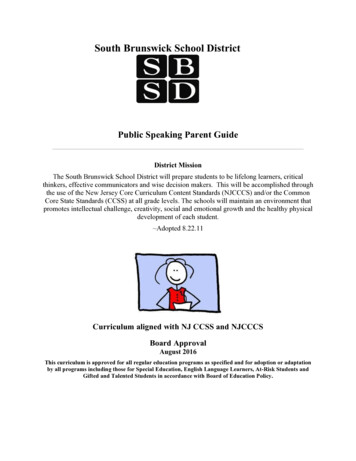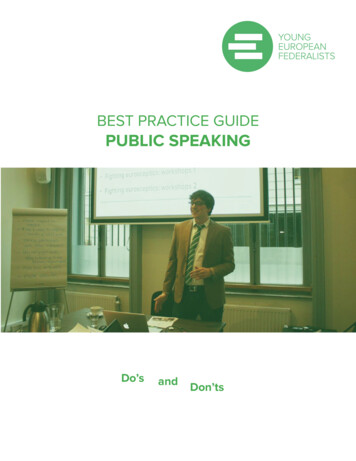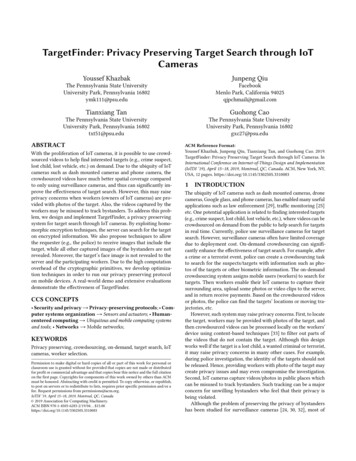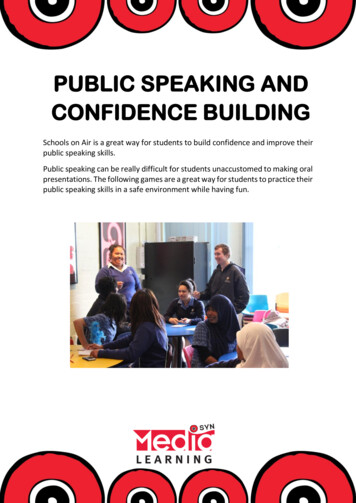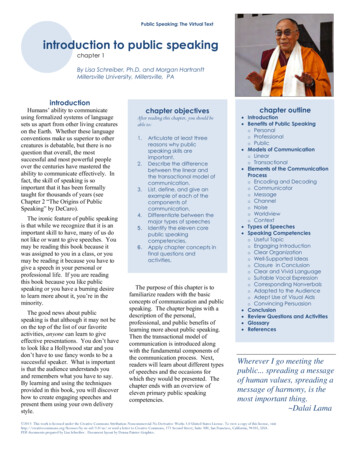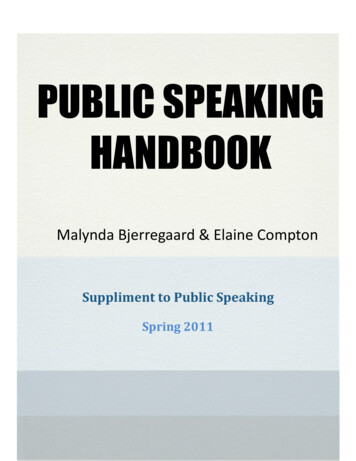
Transcription
PUBLIC SPEAKINGHANDBOOKMalynda Bjerregaard & Elaine ComptonSuppliment to Public SpeakingSpring 2011
ContentsChapter 1.1: Basics of Public Speaking and Communication Apprehension4Chapter 1.2: Ethics and Public Speaking6Chapter 1.3: Communication Apprehension11Chapter 1.4: Importance of Strong Audience Relationship & Intro Speeches17Chapter 2: Listening and Responsibility23Chapter 3.1: Topic Selection and Brainstorming29Chapter 3.2: Basic Speech Structure33Chapter 4.1: Researching Your Topic44Chapter 4.2: Proper APA Reference Page46Chapter 4.3: Source Citing in your Speech48Chapter 4.4: Supporting Material50Chapter 5.1: Audience Analysis57Chapter 5.2: Audience Survey59Chapter 6.1: Basic Speech Format—Introduction64Chapter 6.2: Basic Speech Format—Body68Chapter 6.3: Basic Speech Format—Conclusion71Chapter 7.1: Delivery Preparation76Chapter 7.2: Spoken Delivery Preparation77Chapter 7.3: Nonverbal Delivery—Gestures79Chapter 7.4: Nonverbal Delivery—Appearance and Dress82Chapter 8.1: Visual Aids85Chapter 8.2: Creating a Basic PowerPoint Presentation88Chapter 9.1: Informative Speaking942
Chapter 9.2: Types of Informative Speeches95Chapter 9.3: Guidelines for Informative Speeches101Example Informative Speeches: Brewing Beer105Example Informative Speech: Feng Shui107Informative Evaluation Forms112-133Chapter 10.1: Persuasion134Chapter 10.2: Arguments and Reasoning138Chapter 10.3: Types of Persuasive Speeches145Persuasion Evaluation Forms154-173Example Persuasive Speech: Responsible Drinking176Example Persuasive Speech: To Save A Child (Monroe’s)180Chapter 11.1: Speaking in Small Groups183Chapter 11.2: Leadership184Chapter 11.3: Member Responsibilities185Chapter 11.4: Reflective Thinking Method188Chapter 11.5: Strategies for Group Presentations189Coping with Hitchhikers and Couch Potatoes on Teams192Group Discussion Self Assessment Paper198Group Discussion Participation Evaluations199-2033
Chapter 1.1: Basics of Public SpeakingA recent study published in Science Daily (2009) reports human infants begin learninglanguage in the womb, and have the ability to memorize sounds, melodies, and voicesbefore even being born. For example, a mother’s voice is preferred for infants afterbirth, as are songs and sounds they were exposed to in the womb. The fact that ourminds develop with a strong dedication to learning language as a primary focus fromearly on is an excellent predictor of its overall importance in our life. Sincecommunication is a primary development function, learning how to communicateeffectively is a skill that needs to be developed properly and learned through practiceand critique.Often people will recognize a good public speaker as having a special talent or abilitywith speaking in front of others. While natural talent may play a role in public speaking,there is no evidence that says only those who have a natural talent can give qualitypresentations. This is a skill you can develop with practice. In fact, just as riding a bike,learning another language, mastering writing composition, and many other skills in life,learning how to speak well in public is something that can be taught to do effectivelyand skillfully regardless of the innate talent. And with practice comes more ability tomaster public speaking skills and develop them as something others might recognize asa talent.Why learn public speaking in such detail?You might still be wondering why it is necessary for you to have a whole class dedicatedto refining your skill as an oral presenter. Several reasons exist for you to consider thisclass as important to your college career. Frankly, public speaking could be the mostimportant general education class you take.1. Employment OpportunitiesAccording to the National Association of Colleges and Employers (NACE) Job Outlook2011 survey, employers are looking for job candidates these top five skills and qualities:#1 Verbal communication skills#2 Strong work ethic#3 Teamwork skills#4 Analytical skills#5 Initiative
The NACE Job Outlook 2011 survey states that in the workplace, you need to be able toclearly and concisely communicate with co-workers, clients, and supervisors, hence theimportance of the #1 ranked verbal communication skills. This important skill is oftenevaluated based upon your initial interview with the hiring manager, implying you needto have it firmly established in your set of working skills. To explain this further,consider a phenomenon known as the halo effect (Alder & Proctor, 2007). The haloeffect explains that within the first thirty seconds a person will form an impression ofyou that is either positive or negative and they will have the tendency to cling to thisfirst impression regardless of other experiences they have with you. Knowing how tolook and act the part is critical for first impressions and the unavoidable halo effect thatwill be formed. Your verbal communication can be a great asset to forming the type ofpositive image you’ll want sticking out in the minds of others.Other evidence that qualifies this point can be found in a recent New York Times article.Author Zernike sites a report from The Association of American Colleges and Universitieswho recently asked employers who hire at least 25 percent of their workforce from twoor four-year colleges what they want institutions to teach. They report that 89 percentwant more emphasis on “the ability to effectively communicate orally and in writing,”81 percent asked for better “critical thinking and analytical reasoning skills” and 70percent were looking for “the ability to innovate and be creative” (Zernike, 2009). All ofthese skills are mastered in a good public speaking course. With such a high percentageof employers stating that the skills like these learned in public speaking are necessaryfor hire, you should be especially motivated to learn them, and learn well.As a final example, consider the education and personal success that renownedannouncer for the New York Yankees Mr. Bob Sheppard had during his lifetime. Mr.Sheppard recently passed away at nearly 100 years old after announcing for the Yankeesfor over half a century. His grace and poise with speaking in public could be looked at asa talent, but he would have been the first to admit it is a skill that he has labored toacquire as evidence in his other profession of teaching the public speaking skill toothers. For decades, he taught speech at St. John’s University and John Adams HighSchool in Queens. Mr. Sheppard understood that “clear, smooth speech is somethingeveryone should strive for, and treasure” (Haberman, 2010).2. Increased confidenceKnowing how to communicate effectively in interpersonal or group settings will increaseyour confidence in what you are saying. This will transfer over well to job interviews,professional group presentations and meetings, and even casual conversations with5
your boss or co-workers. The better your ability to speak clearly and effectively, themore confidence you will have in speaking, and the more you are likely to speak. Thiswill transfer into you appearing more like the leader your employer is looking for.Additionally, you should reap the awards of this confidence in your personal life as well.In fact, most college students are interested to know that confidence and self esteemare related to attraction by the opposite gender, especially for men (Brooks, 2011).Studies show that when a person (especially a male person) is confident and has highself-esteem, they are seen as more attractive by the opposite sex. Public speaking couldbe a way to increase this confidence and get you the dates you’ve been wanting!Another example of confidence being a benefit comes from a study conducted by 4-H, aprogram designed for youth skill and development. The 4-H organization recentlypublished a study conducted in the Midwestern United States which found that one ofthe highest rated skills evaluated by their students from ages 11 to 18 is their ability tospeak and present in public (Silliman, 2007). The high rating was reported as being duein part to the confidence they gained from their skills in presenting.3. Educational Benefits for Other CoursesLearning how to organize your thoughts well and critically analyze information will bebeneficial to you in the classroom as well as the workplace. Proper public speakingteaches development of a strong introduction, body, and conclusion for a variety ofspeaking engagements and also employs further organization skills specific to the typeof speaking you are engaged in. It also teaches you to think critically about theinformation that you are preparing for your presentation. In public speaking, you will betaught to craft a message so that you can have a desired impact on your audience; forexample to inform, to persuade, or to entertain are common desired outcomes.Critically analyzing and crafting your message will help you in other facets of youreducation as well since most written assignments will also ask that you preparemessages for a desired outcome. In other words, knowing how to craft a solid messagederived from critical thinking and analysis can help you get better grades in other classesduring your college career.Chapter 1.2: Ethics and Public SpeakingWhat are Ethics?Ethical public speaking is much like ethics you would find in any other situation – requiringknowledge, honesty, integrity, credibility, and giving proper credit for all ideas and words thatare not your own. While some people may struggle with the notion of ethics what is generally6
meant when we refer to ethics is the branch of philosophy that deals with issues of what is rightor wrong in human affairs (Lucus, 2009).The First Amendment to the United States Constitution guarantees every citizen the right tofreedom of speech. As a public speaker this fundamental right comes with responsibility to beethical at every stage of the speech making process.Unfortunately, history is full of people who have been eloquent and persuasive speakers whoare less than ethical. Adolf Hitler is probably the best known example of such a speaker.Speaking of Hitler, Lucus (2009) writes, “His oratory galvanized the German people, but his aimswere horrifying and his tactics despicable. He remains to this day the ultimate example of whythe power of the spoken word needs to be guided by a strong sense of ethical integrity.” Thereis no question that speech is power. Knowing how to correctly use that kind of power iscritically important in a world that is bombarded with unethical speech and behavior. Theethical public speaker is more important today than ever. Incorporating the following guidelinesas you prepare and present your speeches will help you to be an ethical public speaker.1. Know your topicIt is important that you put forth the necessary time and effort required to know andunderstand your subject so that you can speak confidently about it. In other words, befully prepared and researched for every speech. Realize that you are the “expert” in thatmoment and that you need to be aware of and be sensitive to any relevant issues andimplications of your speech. Be sure to get your facts straight to avoid misleading youraudience and diminishing your credibility. When audience members hear informationthey know is incorrect they may being to lose their confidence and trust in you, even ifthe information was inadvertently given.2. Be Honest and FairAlways select and present facts and opinions openly and fairly. This creates an openand fair representation of the information you are gathering and ensures honesty. Infact, most researchers would say that there is nothing more important than honesty inpublic speaking. We operate on the assumption that “words can be trusted and peoplewill be truthful” (Johannesen, Valde, & Whedbee, 2008). It can be very tempting towant to try and shade facts and opinions to make your speech seem even morepowerful, but to do so is unethical. To remain an ethical public speaker, avoid thefollowing: Distorting or concealing information that is relevant to your topicJuggling statisticsMisrepresenting sources7
Quoting out of contextNot telling the whole storyCiting unusual cases as typical examplesAs you strive to be an ethical public speaker it is important that you choose your wordscarefully. While some may argue that “political correctness” has taken over and thatthey have a constitutionally protected right to say whatever they wish, it is important toremember that any language meant to demean, devalue, or stereotype another is notappropriate in the public speaking arena. Avoid: Substituting emotionally loaded language for sound argumentUsing name-calling or any kind of abusive language to silence those who may notagree with you. Remember that certain words have power that can hurt others,“Our identities, who and what we are, how others see us, are greatly affected bythe names we are called and the words with which we are labeled (Haig, 1983).”3. Use credible sourcesWhen you are gathering information and supporting materials for your speech it isimportant to use credible sources. In other words, information that is accurate, current,and reliable. Making sure that you are providing your audience with the most truthful,up to date, and unbiased information possible goes a long way toward developing andmaintaining your credibility as an ethical speaker.For example, if someone wanted to inform their audience about the medical risks andbenefits associated with legalizing marijuana, would it be more credible to cite an articlefrom JAMA (The Journal of the American Medical Association) or a local 4:20 Club(Cannabis Counterculture)? It is much more likely that accurate, current, and reliableinformation would come from JAMA because it has higher standards relating to theseareas that it must maintain. Clearly, certain sources have more credibility than othersand your job as an ethical public speaker is to sort through the available information andthen choose to use only the most credible information available as your supportingmaterials. Ask the following questions as you work to ascertain if the source is credible: Who authored any studies you use?Does the information make sense?When was the information written?8
PlagiarismIn addition to using credible sources you must be careful not to plagiarize. Plagiarisminvolves using someone else’s words, phrases, sentences or ideas without giving themcredit. Lucas (2009) states, “Plagiarism comes from plagiarius , the Latin word forkidnapper. To plagiarize means to represent another person’s language or ideas as yourown—to give the impression you have written or thought something yourself when youhave actually taken it from someone else.” Unfortunately, plagiarism is easier to dotoday because of the easy access we have to all kinds of information on the internet.According to Stephen Lucas (2009) author of The Art of Public Speaking there are threekinds of plagiarism that you will need to be familiar with, global plagiarism, incrementalplagiarism, and patchwork plagiarism. Global plagiarism means that you have taken an entire speech from somewhere elseand you pass it off as if you had written the speech. Sometimes students wait until thelast minute to prepare and feeling under pressure, they use another student’s speech orperhaps even purchase one from the internet. While it may seem like this may solve ashort term problem global plagiarism often has long term consequences far beyondwhat one might expect. Start your speech preparation early so you are not tempted toengage in global plagiarism.Patchwork plagiarism is similar to global plagiarism except that instead of taking justone speech and passing it off as one’s own, the speaker takes two or more sources andcobbles them together to make one speech. This is just as unethical as globalplagiarism.Incremental plagiarism occurs when a speaker fails to give credit for specific parts of aspeech that are taken from someone else. Usually this involves quotations andparaphrasing. The cut and paste phenomenon afforded by the internet would be anexample of incremental plagiarism that needs to be avoided.Plagiarism is a serious problem. According to plagiarism.org (2011), “Many people thinkof plagiarism as copying another's work, or borrowing someone else's original ideas. Butterms like "copying" and "borrowing" can disguise the seriousness of the offense Canwords and ideas really be stolen? According to U.S. law, the answer is yes. Theexpression of original ideas is considered intellectual property, and is protected bycopyright laws, just like original inventions. Almost all forms of expression fall undercopyright protection as long as they are recorded in some way (such as a book or acomputer file).”9
All of the following are considered plagiarism: Turning in someone else's work as your ownCopying words or ideas from someone else without giving creditFailing to put a quotation in quotation marksGiving incorrect information about the source of a quotationChanging words but copying the sentence structure of a source without givingcreditCopying so many words or ideas from a source that it makes up the majority ofyour work, whether you give credit or notMost cases of plagiarism can be avoided, however, by citing sources. Simplyacknowledging that certain material has been borrowed and providing your audiencewith the information necessary to find that source is usually enough to preventplagiarism (Plagiarism.Org, 2011).Never, never, never take someone else’s words, ideas, and thoughts and pass them offas your own. Some students may wonder how is it possible to have only originalthoughts to use in a speech. If we consult Lucas (2009) again he states, “The key is notwhether you have something absolutely original to say, but whether you do enoughresearch and thinking to come up with your own slant on the topic.” The only way to dothis adequately is to start your speech preparation early enough so that you have thetime to do enough research to truly understand and come up with your own ideas aboutthe topic.Checklist for Ethical Public Speaking (Lucas Student Workbook, 2009 p.11)1. Have I examined my goals to make sure they are ethically sound?a. Can I defend my goals on ethical grounds if they are questioned orchallenged?b. Would I want other people to know my true motives in presenting thisspeech?2. Have I fulfilled my ethical obligation to prepare fully for the speech?a. Have I done a thorough job of studying and researching the topic?b. Have I prepared diligently as not to communicate erroneous or misleadinginformation to my listeners?3. Is the speech free from plagiarism?a. Can I vouch that the speech represents my own work, my own thinking , myown language?10
b. Do I cite the sources of all quotations and paraphrases?4. Am I honest in what I say in the speech?a. Is the speech free of any false or deliberately deceptive statements?b. Does the speech present statistics, testimony, and other kinds of evidencefairly and accurately?c. Does the speech contain valid reasoning?d. If the speech includes visual aids, do they present facts honestly and reliably?5. Do I use the power of language ethically?a. Do I avoid name-calling and other forms of abusive language?b. Does my language show respect for the right of free speech and expression?6. All in all, have I made a conscious effort to put ethical principles into practice inpreparing my speech?Chapter 1.3: Communication ApprehensionYou may be thinking that speaking in public is your worst fear, possibly worse thandying. If this is the case, you fit in the category of people reported by a 2007 study inthe Southern Communication Journal which found that public speaking is the majority ofUS citizens’ worst fear. Another new survey conducted by the websiteReasontospeak.com (2011) found that 23% of people rate public speaking as theirgreatest fear, just behind death itself, which was nominated as the great fear by 27% ofthe 1206 respondents.According to flatworldknowledge.com (2011) some key ideas to keep in mind aboutcommunication apprehension is that it will usually stem from a variety of sourcesincluding the speaker’s personality, communication context, the nature of the audience,or the particular speaking situation. Within these sources, there will be other factorsthat can make the communication apprehension worse. The formality that is required,the familiarity of the audience members, the topic being discussed, and the perceivedsimilarity or lack thereof that the speaker has with his or her audience are all examplesof what might cause a person to feel more anxious in a certain situation.Check out the table on the following page posted on flatworldknoledge.com (2011)containing myths or facts about communication apprehension to see how you arecurrently viewing this concept.11
Myths or Facts about Communication ApprehensionInstructions: For each of the following questions, check either “myth” or “fact.” 1. Audiences will know how nervous you feel.mythSome stage fright might be a good thing in making you animated and 2.charismatic.mythMost audiences are basically hostile, looking to see you make a fool of 3.yourself?myth 4. Experienced speakers don’t feel any stage frightmyth 5. Most speakers tend to relax as they progress through their speeches.mythMoving around the front of the room during your speech will make you less 6.nervous.myth 7. Most audiences would rather see a speaker do well.mythFocusing on the audience rather than yourself is an effective way to reduce 8.your stage fright.mythThe positive or negative label you ascribe to the public speaking situation 9.will impact how nervous you feel.mythTelling a joke in your introduction is guaranteed to get the audience on your 10.side.mythScoring: Myths: # 1, #3, # 4, # 10 Facts: #2 #5, #6, #7, #8, #9 fact fact fact fact fact fact fact fact fact factAre you surprised by the results you got? Communication apprehension can be positivefor speakers because it causes an adrenaline rush to flow through your veins, giving youenergy and life in what you are saying. Learning how to channel this energy and keep itin a positive balance is the key for successful speaking experiences.Reducing Communication ApprehensionJames McCroskey is one of the most prominent researchers in communicationapprehension and has been studying it for more than half a century. In one study, heoutlines three specific things that can be done to reduce communication apprehension(Berger & McCroskey, 1982):1. Systematic de-sensitization2. Cognitive modification3. Assertiveness training
Systematic De-sensitizationSystematic de-sensitization refers to exposing yourself to whatever it is you are afraidof. In a public speaking class, you will get this through repeatedly giving speeches inyour classroom environment. The more you speak in class, the lower your anxietyshould be. Practicing your speeches in the classroom environment and in front ofclassmates and/or your teacher before-hand would also be an example of systematicde-sensitization. The more times you do this, the more de-sensitized you should beabout speaking in public, and thus the lower communication apprehension you shouldhave with your speeches.Cognitive ModificationAccording to Berger & McCroskey (1984), cognitive modification is based on learningtheory where people have to realize that they have been taught to think negativelyabout themselves and thus, they need to be taught to think more positively. Somethingthat can help with cognitive modification is to identify the negative thoughts a personhas about themselves and then correct them with honest, more positive thoughts. Asuggestion could be to write down the negative thoughts that you have about giving aspeech in one column and then write down a positive response to these negativethoughts corresponding column. Teaching yourself to think positively can help yougreatly overcome the anxiety of the situation and become a self-fulfilling prophecy foryour apprehension.Assertiveness TrainingBerger & McCroskey (1984) continue that assertiveness training will reduce anxiety bytraining people with specific skills so that they know how to more effectively obtaintheir desired effects in social interactions. Completing assertiveness training shouldhelp the speaker realize that they are in charge of their outcome in public speakingsituations. You will gain some of the same principles taught in assertiveness trainingcourses by completing your public speaking class. During this semester, you will betaught to become the expert in public speaking in technique and delivery. Throughoutthis training, you should begin to feel yourself becoming more confident in publicspeaking situations as you gain more experience and training in its concepts. Some ofthe tips you will learn regarding reducing communication apprehension are as follows:Believe in your topic; View the speechmaking process positively; Visualize success;Project confidence; Test message and proactive delivery; and Gain perspective after youhave given your speech.13
Communication Apprehension TestUnderstanding how big of a fear you actually have with public speaking is an importantbaseline to know. Knowing this will help you plan out the amount of preparation andadditional precautions that will need to be taken so you can feel like you have yourstress under control. If you feel apprehensive about speaking in public, consider takingthe quiz on the following two pages to determine how severe your communicationapprehension is. If your score comes back as severely apprehensive, talk to yourinstructor to get more individual help in combating this.
Communication Apprehension QuizInstructions: Here are twenty-four statements that ask how you feel about communicating. Don’t worry if somestatements seem similar to other statements. In the space to the left of each item rate the extent to which thestatement describes you. Record your first impressions without analyzing the statements closely. Use the followingscale:1 Strongly agree—it describes me2 Agree – it describes me3 Undecided how well this describes me4 Disagree that this describes me5 Strongly disagree that this statement describes me1.I dislike participating in group discussions.2.Generally, I am comfortable while participating in group discussions.3.I am tense and nervous while participating in group discussions.4.I like to get involved in group discussions.5.Engaging in group discussions with new people makes me tense and nervous.6.I am calm and relaxed while I participate in group discussions.7.Generally, I am nervous when I have to participate in a meeting.8.Usually, I am calm and relaxed while participating in meetings.9.I am calm and relaxed when I am called on to express an opinion at a meeting.10.I am afraid to express myself at meetings.11.Communicating at meetings usually makes me uncomfortable.12.I am relaxed when answering questions at a meeting.13.While participating in a conversation with a new acquaintance, I feel nervous.14.I have no fear of speaking up in conversation.15.Ordinarily, I am tense and nervous in conversations.16.Ordinarily, I am calm and relaxed in conversations.17.While conversing with a new acquaintance, I feel relaxed.18.I’m afraid to speak up in conversations.19.I have no fear of giving a speech.20.Certain parts of my body feel tense and rigid while giving a speech.15
21.I feel relaxed while giving a speech.22.My thoughts become confused and jumbled when I am giving a speech.23.I face the prospect of giving a speech with confidence.24.While giving a speech I get so nervous I forget facts I really know.Computing your score: This test allows you to calculate your overall communication apprehension score and yourcommunication apprehension scores for particular speaking situations.Group Score:Add scores for items 2,4, and 6.Subtract scores for items 1,3, and 5.Add 18 points .Meeting Score:Add scores for items 8,9, and 12.Subtract scores for items 7,10, and 11.Add 18 points .Dyad Score:Add scores for items 14,16,and 17.Subtract scores for items 13,15, and 18.Add 18 points .Public Speaking Score:Add scores for items 19, 21,and 23.Subtract scores for items 20,22, and 24.Add 18 points .TotalAdd the four sub scores together.Total Communication Apprehension ScoreThe overall scores may range from 24 to 120 (If your score is higher than 120 or less than 24, you calculatedincorrectly).Scores of 83 or more indicate relatively high communication apprehension. People who score in this rangetend to talk little, be shy, and are somewhat withdrawn and nervous in speaking situations.Scores of 55 or less indicate relatively low communication apprehension. People who score in this range tendto enjoy being with others, like to talk, and feel confident of their communication ability.Chapter 1.4: Importance of a Strong AudienceRelationship and Introduction Speeches16
It certainly tends to be nerve racking to present a message in front of people you don’tknow, who are evaluating you, and possibly judging you and your message withunknown measures. However, practice and experience in the public speaking realmdoes lessen this fear. During the semester, you will be able to form bonds with yourclassmates, hopefully knowing them by name and associating with them on a closerbasis during class projects and discussions. You will also have a known evaluationprotocol that all classmates will be following so that you can anticipate how you will beevaluated. These factors should help facilitate a more welcoming environment topractice working on your speaking skills. Through the positive feedback you receive,and by being able to view and understand how you are growing as a speaker, you shouldbe able to feel the fear of public speaking lessen and see it replaced by
Chapter 1.1: Basics of Public Speaking and Communication Apprehension 4 Chapter 1.2: Ethics and Public Speaking 6 Chapter 1.3: Communication Apprehension 11 Chapter 1.4: Importance of Strong Audience Relationship & Intro Speeches 17 Chapter 2: Listening and Responsibility 23 Chapter 3.1: Topic Selection and Brainstorming 29
